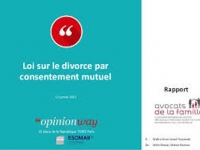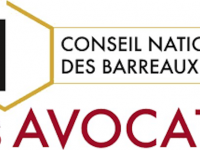News
A STUDY SHOWS 82 % OF THE FRENCH PEOPLE WOULD RATHER CALL FOR A LAWYER
WHEN MUTUAL CONSENT IN CASE OF DIVORCE

NBC Logo (Source: NBC)
USPA NEWS -
It appears from the study on divorce by mutual consent that the National Council of Bars ordered the IPSOS polling company, that the majority of French people favor the lawyer in the event of divorce.
Listening, advice, legitimacy, saving time, the lawyer ticks all the boxes.
The results of this study testify to the confidence that the French have in the legal profession:
- 94% of them are very familiar with the principle of mediation and would gladly use it
- 77% would be ready to discuss between spouses and with the assistance of a lawyer before going before the judge
- 94% would call in priority to a lawyer in the event of a divorce
- 5% to a notary
3% to a judge
Listening, advice, legitimacy, saving time, the lawyer ticks all the boxes.
The results of this study testify to the confidence that the French have in the legal profession:
- 94% of them are very familiar with the principle of mediation and would gladly use it
- 77% would be ready to discuss between spouses and with the assistance of a lawyer before going before the judge
- 94% would call in priority to a lawyer in the event of a divorce
- 5% to a notary
3% to a judge
IN FRANCE OF DIVORCE NO NEED TO SEE A JUDGE IF IN MUTUAL CONSENT -----------------------------------------
For a divorce by mutual consent, the spouses do not need to appear before the Judge for Family Affairs unless a child of the spouses requests to be heard by the judge. An agreement drawn up between the spouses and by their respective lawyers may be drawn up. The agreement must be filed with a notary. The request can be made if the spouses agree on the divorce and all its effects (partition of property, parental authority, alimony, compensatory allowance). No minimum marriage duration is required. The spouses do not have to disclose the reasons for the divorce. They should contact their respective lawyers.
Divorce by mutual consent by private signature countersigned by lawyers cannot take place if: the minor, informed by his parents of his right to be heard by the judge, requests to be heard by the judge; one of the spouses is placed under one of the regimes of protected adults (that is to say guardianship, curatorship or the safeguard of justice).------------------------------------
The lawyer sends the spouse whom he assists, by registered letter with acknowledgment of receipt, a draft agreement. This project cannot be signed by the spouses before the expiration of a reflection period of 15 days from receipt. If one of the spouses signs the agreement before the deadline of 15 days, the agreement becomes null. This agreement takes the form of a private signature countersigned by each of the spouses' lawyers. It is signed by the spouses and their lawyers in 3 copies. Each spouse keeps an original of the agreement accompanied by its appendices. The 3rd original is for the notary. The agreement is sent to the notary within 7 days of the date of signing the agreement. Source : NBC and Service Public
Lawyers National Bar Council Divorce Mutual Consent Christiane Feral Schull Jedi Foster Rahma Sophia Rachdi
Liability for this article lies with the author, who also holds the copyright. Editorial content from USPA may be quoted on other websites as long as the quote comprises no more than 5% of the entire text, is marked as such and the source is named (via hyperlink).







